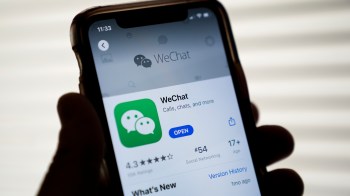Chinese social media app targets the U.S. market
If you own a smartphone in China, odds are you’re using Wechat. Advertising agency manager Li Jing says most of her phone use is devoted solely to this app. Even her 74-year-old father uses it, she says. The app allows users to text, send walkie-talkie voice messages to each other, share photos and video messages, and it also uses GPS to let you know if friends are nearby.
“It’s so fast,” says Li. “I no longer have to type messages. When I’m on the go, I can just record a quick voice or video message and my friend will get it immediately.”
But Wechat’s popularity doesn’t stem so much from how awesome it is, but because Tencent offers it free of charge. And that’s meant big savings for many Chinese, who tend to be prolific texters.
“If people’s social networking activities become more popular on the mobile phone, rather than on the computer, it’s going to shift the social networking landscape,” says Jeremy Goldkorn, founder of the Chinese media blog Danwei.
He says as more people shift from laptops to smartphones, so goes social media. He says Wechat is popular because it doesn’t push users to post their passing thoughts publicly for all to see like Facebook or Twitter. It’s meant to be a private network between you and your closest friends.
“I think many people are starting to get fatigue from the public nature of most social networks,” says Goldkorn. “I think it does offer the chance of returning social networking to its actual social origins, rather than as a system of public narcissism.”
And that’s caught on well beyond China’s borders. Tencent has hired international soccer star Lionel Messi to appear in ads for the South American market. And now Tencent has plans to open an office in the U.S.
But the company is, of course, Chinese. And that may be a problem for people worried about privacy, says Jeremy Goldkorn.
“American Internet companies are going to have a wild time talking about security issues, talking about censorship. It’s going to be very tough for them to get user acceptance and trust in the United States.”
But in light of revelations that the NSA is snooping into emails, too, now might be the perfect time for Wechat to give the U.S. market a try.
There’s a lot happening in the world. Through it all, Marketplace is here for you.
You rely on Marketplace to break down the world’s events and tell you how it affects you in a fact-based, approachable way. We rely on your financial support to keep making that possible.
Your donation today powers the independent journalism that you rely on. For just $5/month, you can help sustain Marketplace so we can keep reporting on the things that matter to you.


















